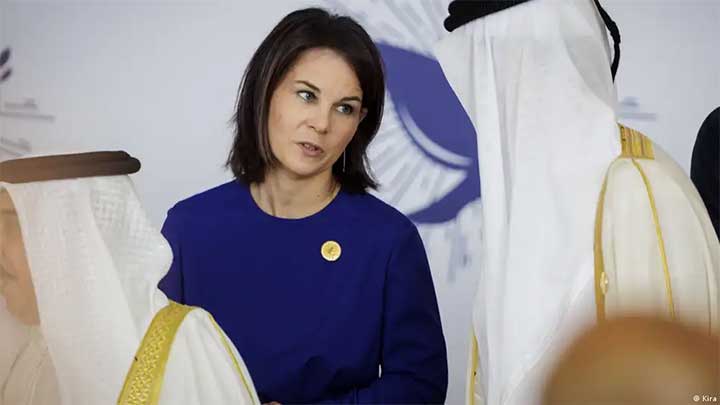
Germany's foreign minister visited Israel and neighboring countries in an attempt to help mediate between various actors and promote mutual understanding. But Germany wouldn't likely play a prominent role in peace talks.
Jordan, Israel, Lebanon, Egypt: In just three days, German Foreign Minister Annalena Baerbock has held intensive crisis talks in four countries. Her goals are to prevent Israel's war against Hamas from spreading, and to help mitigate the humanitarian disaster in the Gaza Strip.
At the Cairo Summit for Peace on Saturday, Baerbock spoke of the suffering and worry that people on the ground were facing. "Across the region, we see terrible human grief and fear," Baerbock said.
Baerbock also pointed a finger at what Germany's government has identified as the source of this suffering: "It was Hamas that brought horrendous terror over Israel on October 7, committing atrocious crimes."
In the short term, Baerbock said, the priority would be easing human suffering in the Gaza Strip. To this effect, Germany has increased its humanitarian aid to Gaza by €50 million ($53.1 million).
On Thursday, Baerbock spoke with Philippe Lazzarini, commissioner-general of the United Nations Relief and Works Agency for Palestine Refugees in the Near East (UNRWA), about the deteriorating humanitarian situation in Gaza.
As of Monday, the UNRWA reported more than 400,000 internally displaced people in agency shelters. Over 5,000 people have been killed in 16 days of strikes on Gaza, according to the Health Ministry. In an additional statement, Lazzarini warned that fuel for UNRWA facilities would run out within days, leaving the people sheltering with the agency without water.
Peter Lintl, a research associate who focuses on North Africa and the Middle East for the Berlin-based German Institute for International and Security Affairs (SWP), said Germany could play a limited part in mediating. For example, Lintl said, "Germany can act in a supporting role" when it comes to hostage negotiations.
Lintl said the country would not likely be able to provide much support by that for one simple reason:
Germany might, however, be able to help organize humanitarian aid to the Gaza Strip. "Israel accepts it," Lintl said, "because the US government also demands this aid."
Lintl said some Arab governments were skeptical about what Germany propagates as its "values-driven" foreign policy. He said this became evident during several incidents surrounding the 2022 soccer world cup in Qatar, for example.
In many Arab countries, "people are observing these politics with a certain reservation," Lintl said. "What's more, Western capitals, including Berlin, consider the condemnation of Hamas and the acknowledgement of Israel's right to self-defense as a condition for negotiations."
Baerbock has experienced this reservation firsthand. According to media reports, her statement that Israel had fallen victim to "terrorist attacks ... from Gaza" and had the right to self-defense was received with caution in Amman.
Lintl said skepticism about Germany's motives was widespread. "But, at the same time, there is a pragmatic willingness to cooperation wherever possible," he said.
Solidarity with Palestinians
The talks Baerbock held over the weekend were accompanied by numerous solidarity marches. On Friday, thousands took to the streets of Cairo, Amman, Beirut and Baghdad to show their support for people in the Gaza Strip and solidarity with Palestinians.
Since October 7, violence in the occupied West Bank has been on the rise, with more than 90 Palestinians killed, mostly by Israeli troops and settlers, according to the Palestinian Health Ministry and human rights groups.
Simon Wolfgang Fuchs, an associate professor of Islam in South Asia at the Hebrew University of Jerusalem, told DW that government decisions in Arab countries were influenced by the impression that Western countries stood uncritically and unconditionally by Israel. "In many places, politicians who work closely with Western nations are now under a lot of pressure," he said.
Lintl said Israel's goal was to end the rule of Hamas, which the EU, Germany, the US and other governments designate as a terrorist organization. "Any mediation would contravene this goal," he said.
While you're here: Every Tuesday, DW editors round up what is happening in German politics and society. You can sign up here for the weekly email newsletter Berlin Briefing.